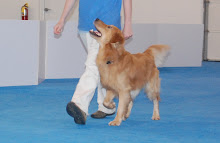Example: Family presents the problem of the dog (adult, young Labrador Retriever) approaching family members and growling.**
Question: When does this happen?
Response: When we are sitting on the couch.
Question: What is your dog doing during the growling?
Response: He has a toy. He comes over and growls.
Question: What do you do?
Response: We put the leash and walk him around and make him sit. We put him in his crate sometimes. Sometimes we ignore him.
Question: What is he doing right before the growling and right after?
Response: Before, he gets a toy, comes over, hits us with the toy and growls. After the growling, he puts his front end on the ground and is wiggly.
We suspected it was about inappropriate ways to get attention. The initial training steps have been teaching the dog to stay/relax, to focus on the handlers, to get his attention needs met before the family settles for the evening, and to teach him better ways to get attention.
The questions I most ask:
Do you want to change that behavior? Is it important to you to stop/change the behavior? Sometimes the family does not. Sometimes they do. Sometimes they think they do, but don't want to put in the work (which is understandable!).
Do you think he enjoys/likes XYZ?
What are your goals?
Has the behavior changed (better, worse, the same) over time? How?
How would you use a stay/sit/down? Sometimes people want behaviors for things that aren't as relevant for the problem.
And a few questions I've been asking more often:
What can I do to help you learn, what kinds of things make it easier for you to understand? (Sending home books/written notes for some students, demos for others, letting them watch me, or directing to a video)
Is XYZ an option? Rather than say to do XYZ..... (put the dog in his crate, keep him on leash in the house, etc.... I ask about compliance before sending them home. If they won't do it....we need to find another way.)
How do you know XYZ?
Some of the questions I ask are to see what the students understand.
Examples:
1) I see a dog pulling on leash. "Is he pulling on the leash?" "No!" I learned that the student has a different understanding of pulling or is not able to perceive the added pressure from the dog.
2) I hear that the training didn't go well in the week. "What exercises did you try?" And then the student responds with things that are completely NOT what I said...but I can see how they had misunderstood. I go over things again and then write down the key points or have the student write it down.
 |
| Happy 2nd Birthday to this dog who was a board and train as a puppy. He's training to be a Search and Rescue dog and I really miss him! |
**A few details changed for privacy!




No comments:
Post a Comment